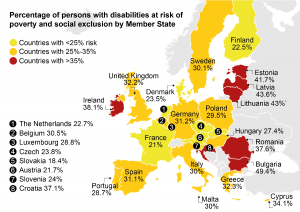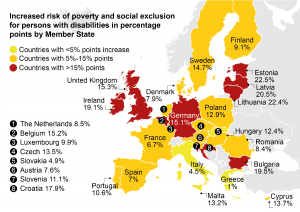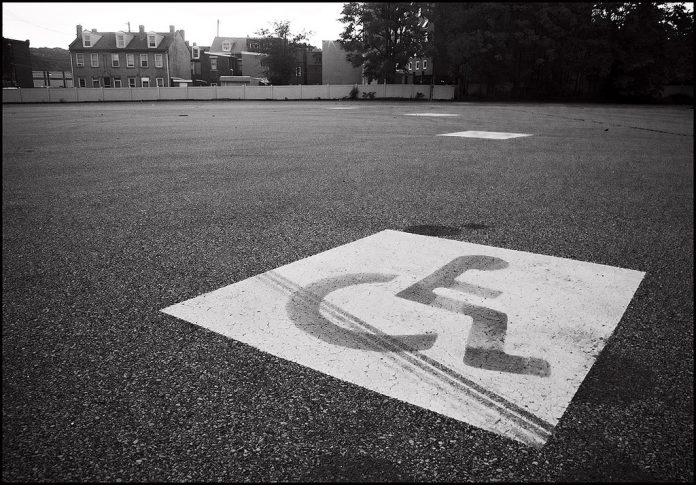Luminita, from Romania, was denied education and, when working, had her wages withheld. Sven, from Sweden, lives in fear of losing his assistance and having to live in a residential institution. Maria Chiara’s family, in Italy, and Joncour’s family, in France, live in a precarious condition because the state does not pay for their personal assistance. Matthieu was expelled from the UK to his native France because he was perceived as a “undue burden”.
These examples show how EU countries have largely failed at reducing poverty of persons with disabilities: 28.7% of the persons with disabilities living in the EU, more than 1 in 4, are poor or at risk of poverty.
The situation has actually gotten worse since 2010 in 11 countries: Estonia, Luxembourg, Germany, Sweden, Ireland, Czech Republic, Lithuania, Italy, Netherlands, Malta and Spain.

Map of percentage of persons with disabilities at risk of poverty and social exclusion by Member State coulours in yellow for countries with less 25% risk (Slovakia 18.4%, Czechia 23.8%, France 21%, Austria 21.7%, Netherlands 22.7%, Finland 22.5%, Denmark 23.5%, Slovenia 24%); Orange for countries with 25%-35% risk (Luxembourg 28.8%; Poland 29.5%, Hungary 27.4%, Portugal 28.7 %, Italy 30%, Spain 31.1%, UK 32.2%, Sweden 30.1%, Malta 30%, Germany 31.2%, Belgium 30.5%, Cyprus 34.1%, Greece 32.3%; Red for countries with >35% (Romania 37.6%, Croatia 37.1%, Ireland 38.1% Latvia 43.6%, Lithuania 43% , Estonia 41.7%, Bulgaria 49.4%
Source: European union statistics on income and living conditions 2018, except Slovakia, Ireland and the UK for which that data is from 2017
In all EU countries, persons with disabilities are more likely to be poor and more likely to be unemployed than persons without disabilities. Not only are persons with disabilities poorer, but they also face extra costs from living in a society that is not adapted to them: costs estimated at 23,012 euros/year in Sweden or 14,550 euros/year in Belgium, for example.
The situation is even worse if they live in rural areas, are woman, young, belong to ethnic minorities and/or other discriminated groups.

Source: European union statistics on income and living conditions 2018, except Slovakia, Ireland and the UK for which that data is from 2017
These are just some of the many findings from our upcoming European Human Rights report. Overall, our report shows that EU countries have failed in ensuring proper protection and support of persons with disabilities, especially in the wake of the financial crisis.
This is why today, on the International Day of Persons with Disabilities, the European Disability Forum, an umbrella organisation of persons with disabilities that defends the interests of 100 million Europeans with disabilities, calls on the European Union and national and local authorities for stronger measures to fight the poverty of persons with disabilities, including:
Fixing disability assessment: all EU countries should follow an approach that looks at a combination of impairment, functional, social and environmental considerations. The recognition of disability should be harmonised and recognised throughout the EU, so persons with disabilities don’t have to submit to assessments each time they move countries.
Stopping the “benefits trap”: Do not try to push persons with disability into employment by reducing disability allowance. Ensure disability benefits provide a stable, liveable income. Ensure benefits account for the extra costs persons with disabilities incur. Ensure benefits are not cut nor stopped when a person with disabilities starts work.
Investing in accessibility, support structures and services: Ensure housing-first solutions that allow people with disabilities to live in the community. Invest EU and national funds in the accessibility of mainstream services to minimise disability-related costs. Invest in support services including housing and living support systems, health and mental health support systems and support to employment.
EDF calls on the EU and its Member States to honour their commitments to the UN Convention on the Rights of Persons with Disabilities and to ensure that all persons with disabilities are able to live with dignity in the community, with equal access and equal rights.

